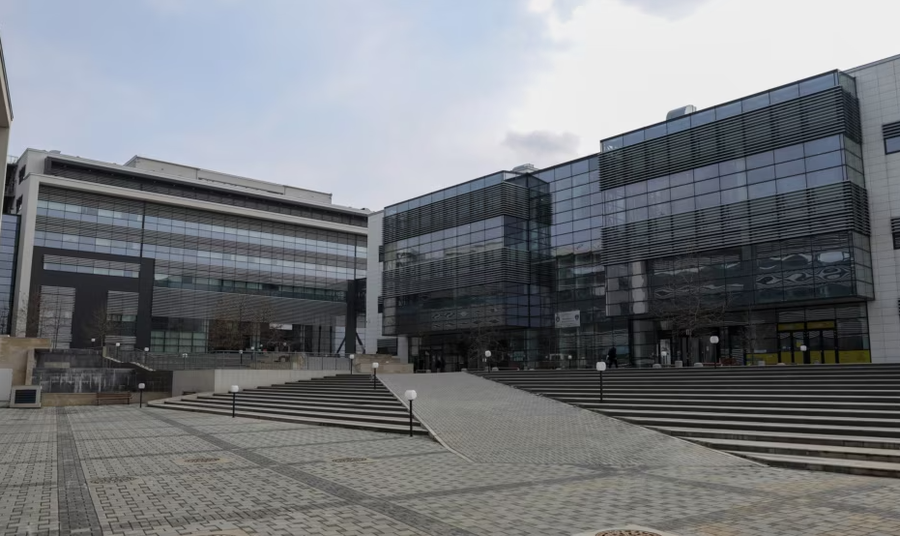
The Basic Court in Pristina has dismissed, due to lack of evidence, an indictment for document forgery and money laundering against Ekrem Lluka, Korab Lluka, Klodian Allajbeu, Igli Larashi and Edlira Malaj, as well as three companies, American Hospital Kosova, Medbrand KS and the Kosovo Cardiac Center.
Prosecutors accused them of laundering money through a scheme of forging documents and presenting false documents to the Kosovo Tax Administration (ATK), with benefits worth over 3 million euros, reports Betimi për Drejtësi.
Prosecutors suspected that - Ekrem Lluka, owner of the Kosovo Cardiac Center together with Korab Lluka, Klodian Allajbeu, shareholder and legal representative of American Hospital Kosova with Igli Larashin, executive director at that hospital, as well as the owner of Medbrand KS, Edlira Malaj - had all taken these actions "after realizing they were being investigated" by the ATK and prosecutors.
They had pleaded not guilty to all charges.
The court said on Monday that the statute of limitations has expired for the first count of the indictment for forgery of documents, while for the second count of money laundering there is insufficient evidence to support a well-founded suspicion that the defendants committed the offense in question.
The prosecution has 10 days to appeal this decision.
The prosecution filed the indictment against them in December 2024, and the court said that after receiving the indictment, it had conducted its official review, and on January 21, it ordered the prosecutor to complete the indictment within 30 days.
Subsequently, the prosecutor in the case, Dren Paca, on January 28, filed a request to exclude Judge Vesel Ismaili from the trial of the case, which request was not accepted by the President of the Court, Albina Shabani-Rama, on February 13.
Subsequently, on February 19, Prosecutor Paca submitted the amended indictment to the Court, and the Court scheduled the initial hearing for March 20, where the defendants pleaded not guilty.
After that, the accused and their defense attorneys challenged the evidence and requested that the indictment be dismissed.
Court: No evidence of document forgery
According to the indictment, the defendants were suspected of forged contracts, through which they allegedly benefited illegally, and which they "laundered by purchasing properties inside and outside Kosovo."
However, the court said that from the circumstances described in the indictment, "there is no question of falsification of documents due to the fact that all of them: contracts, complaint-contracts, agreements, delivery notes, debit notes, etc.; are signed by the relevant persons and there is no interference in them."
Without these elements, the Court emphasized that there is no criminal offense of forgery, and that the defense attorneys have rightly claimed that there are no elements of the criminal offense of document forgery from the actions of the accused.
The Court further found that the Prosecution violated a fundamental principle in criminal law by failing to apply the law that was in force when the defendants were suspected of having committed the criminal offenses of document forgery, for which they were charged.
This is because the Special Prosecution Office charges the accused with document forgery during 2014 and 2015, when the 2012 Criminal Code was in force, and the Prosecution has qualified the actions under the 2019 Criminal Code, which is stricter.
According to the court, since there is no criminal offense of document forgery, there cannot therefore be a criminal offense of money laundering.
The Court also found that for some of the criminal offenses, the statute of limitations for criminal prosecution has been reached based on the 2012 Criminal Code.
The decision states that the criminal offenses are alleged to have been committed during 2014 (counts I, II and III of the indictment) and 2015 (counts IV and V of the indictment), and that the punishment for them is over 1 year to 3 years of imprisonment, and that the decision to initiate the investigation is dated October 12, 2022, which means that the statute of limitations for criminal prosecution has been reached, because 7 and 8 years have passed since the commission of the criminal offenses, respectively.
Further, the decision states that the Prosecution claims that with the forged documents, the accused earned money, which they then laundered, but has not provided explanations as to who earned it, who is the victim, how much money each defendant earned from criminal offenses, where this money came from, where they laundered it, what property they purchased with that money, and where that property is.
"It is not possible to make money with forged documents without harming anyone - logically and objectively this is impossible," the decision states.
The court emphasized in the decision that the Special Prosecution Office did not mention any specific accounts, no transfers made from the allegedly dirty money.
Meanwhile, it is said that the court was proposed confiscation of some properties without identifying where they are located and without arguments as to what evidence has been used to prove that these properties, money transfers or bank accounts are the product of document forgery./ REL (A2 Televizion)










